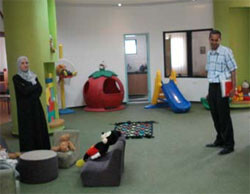Palestinian Center for Human Rights 19 May 2008

The Atfaluna Society for Deaf Children (PCHR)
Every day parents call the Atfaluna Society for Deaf Children in Gaza City and ask Suad Lubbad when the school will re-open. Suad is the Administrative Director of the school, which has 275 pupils aged 4-17, and was forced to close without notice in mid-April. Because of chronic fuel shortages, the buses that normally transport the pupils to school were suddenly grounded. Ninety percent of private cars in the Gaza Strip are still off the roads, and taxi rates have doubled in the last eight weeks, so there was no alternative transport for the pupils, who are now stranded at home.
Suad says many of the pupils at Atfaluna depend on the school for their social contact. “Many of them are very isolated at home, because they literally have no one to communicate with,” she says. “They feel that they belong here, because we really respect them. All the staff use sign language, and we also work to support them at home, by teaching their parents sign language, and encouraging them to use it.” The majority of the pupils come from extremely poor backgrounds, so Atfaluna provides them with one hot meal a day, which Suad says has dramatically improved their ability to concentrate. The school also offers pupils hearing aids and the appropriate batteries. The hearing aids are expensive; each one costs at least 1,300 shekels (almost $400). But Atfaluna hasn’t received new hearing aids or batteries since the Israeli authorities prevented a consignment from entering Gaza six months ago, on the grounds of “security.”
“There is now an acute shortage of hearing aids and the appropriate batteries in Gaza,” says Suad. “If a child has been using a hearing aid and the battery is finished, then his abilities will start to deteriorate. Eventually it will be as though he learned nothing. The vast majority of children attending our school have been diagnosed as profoundly deaf, so they really depend on hearing aids. And now they are being punished by the siege.”
There are approximately 25,000 deaf and hearing-impaired people in the Gaza Strip, many of whom have no specialist support service. The Atfaluna Society for Deaf Children was set up in Gaza in 1992 by an American, Gerry Shawa, who has lived in Gaza City since 1971. The society started out in a rented house, with a small team of volunteers supporting 27 deaf and hearing-impaired children. Sixteen years later it has 168 employees, runs a full-time school, and has a specialist outreach team of social workers who are all proficient in Arabic sign language. In addition to the school, Atfaluna also runs an advanced studies program for 88 older students who struggled in mainstream education, and now want to improve their literacy skills. This program also had to be suspended because of the fuel crisis, but the program resumed one week ago, although the main school remains closed.

Iman and Fadwa (PCHR)
“Life is getting worse in Gaza because of the siege,” says Iman. “My family is already struggling, and when I am stuck at home all day, it puts more pressure on them, and me. They don’t always want to sign with me, so I get lonely. I am very glad to be back at the school too, and I hope we don’t have to stop our classes again.”
Collective punishment of a civilian population is illegal under international human rights law. However, the fuel crisis imposed by Israel, which is disrupting education in schools across the Gaza Strip, and has hit special needs pupils especially hard, amounts to collective punishment. Schools are struggling with cope with insufficient resources, shortages of electricity, low morale, and a public transport system that simply cannot cope with the overall demand. Suad Lubbad and her colleagues do not know when they will be able to re-open their school. Meanwhile their 275 pupils are being denied their right to an education, and remain stranded at home, waiting.
“Our pupils often joke that this is actually their school, not ours,” she says. “They have great potential as individuals, and we just want them to be able to come back as soon as possible.”
This report is part of the Palestinian Centre for Human Rights’ Narratives Under Siege series.
Related Links